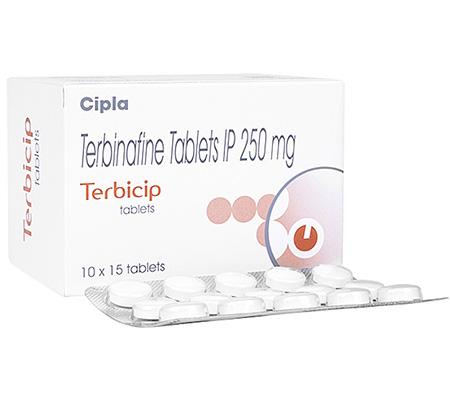Terbicip is used to treat fungal infections of the skin, which includes the treatment of tinea corporis, tinea cruris, tinea pedis, and yeast infections of the skin caused by the genus Candida where oral therapy is generally considered appropriate, owing to the site, severity or extent of the infection. Terbicip is also used to treat infections caused by Tinea capitis and Onychomycosis (fungal infection of the nails) caused by dermatophyte fungi. The active ingredient present in Terbicip is Terbinafine Hydrochloride.
The recommended dosage of Terbicip for adults is One tablet of Terbicip 250 mg once a day. The length of treatment varies according to the type of infection and the severity of the infection.
You should take Terbicip at the same time every day or you would otherwise have peaks with high or low levels of the medication in your body. This way you obtain the highest efficiency of the medication and maintain a constant level of the active ingredient being absorbed into your body and blood stream. You are also likely to experience less potential side effects. If you forget to take your medicine then take it as soon as possible. However, skip the forgotten dosage if it is almost time for your next normally scheduled dose as you should never take a double dose of Terbicip even if you forget to take your medication for several days. Taking a double dose or taking two doses within a short period of time may increase side effects and other health risks while there are no increased benefits. Terbicip is usually taken once daily for 6 to 12 weeks. Take the tablet with a full glass of water.
Terbicip is contraindicated in individuals with hypersensitivity to Terbinafine HCl or to any inactive ingredients of the medication.
The most commonly reported side effects during treatment with Terbicip were gastrointestinal symptoms (including diarrhea, dyspepsia, and abdominal pain), liver test abnormalities, rashes, urticaria, pruritus, and taste disturbances. In general, the side effects were mild, transient, and did not lead to discontinuation.
Seek immediate medical attention or go to your nearest doctors’ clinic, hospital, or emergency room if you experience an allergic reaction or suffer a hypersensitive reaction such as difficulty in breathing or swallowing, swelling of the limbs or face, tight chest, hives, and skin rashes. Stop taking Terbicip tablets and call your doctor at once if you have a serious side effect such as: fever, chills, body aches, flu symptoms, sores in your mouth and throat; joint pain or swelling, swollen glands, patchy skin color, or a butterfly-shaped skin rash over your cheeks and nose; changes in mood or behavior; hearing problems; weight loss due to taste changes; raised, silvery flaking of the skin; or
Severe skin reaction - fever, sore throat, swelling in your face or tongue, burning in your eyes, skin pain, followed by a red or purple skin rash that spreads (especially in the face or upper body) and causes blistering and peeling.
Less serious Terbicip side effects may include: upset stomach, gas, diarrhea, mild nausea or stomach pain; headache, dizziness or spinning sensation; mild skin rash or itching; or unusual or unpleasant taste in your mouth.






